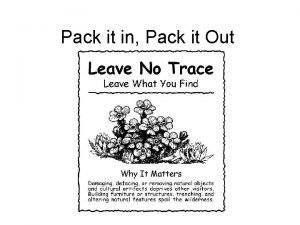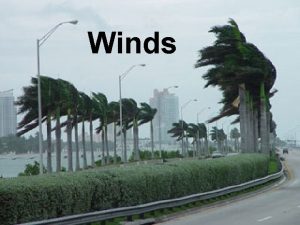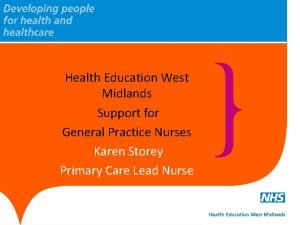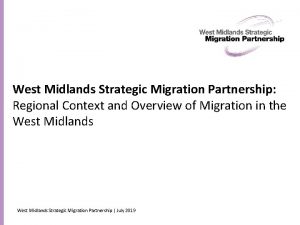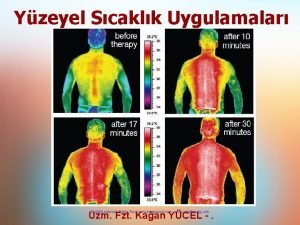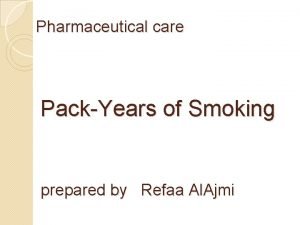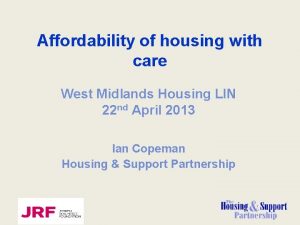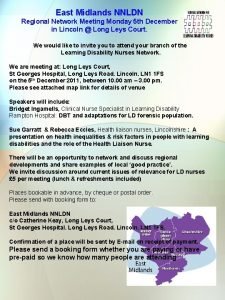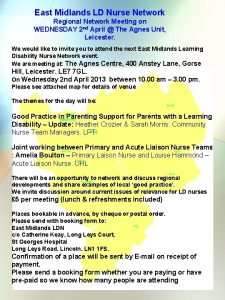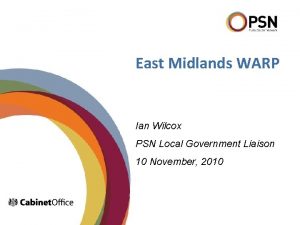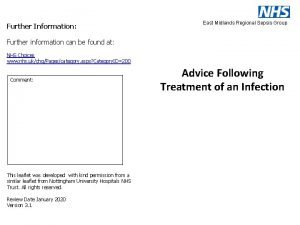EAST MIDLANDS 5 PACK 1 HOUSING Housing as
































- Slides: 32

EAST MIDLANDS 5 PACK + 1 - HOUSING

Housing as a determinant of health: what does this mean for the EHP? Dr Stephen Battersby President, CIEH

Number of people killed or injured by location Per year UK France Killed Injured 380 1, 500, 000 700 1, 150, 000 On the road 3, 600 317, 000 7, 600 170, 000 At home 4, 100 2, 700, 000 9, 000 3, 000 At work Source: WHO Europe 2005

Source: Dahlgren G and Whitehead M (1991) Policies and strategies to promote social equity in health. Stockholm, Institute for Futures Studies

A health map for the local human habitat Source: Barton H & Marcus Grant M, 2006, JRSPH, 126 (6)

Marmot Review: Social determinants of health • The conditions in which people are born, grow, live, work and age, including the health system (environmental health is part of the health system) • These circumstances are shaped by the distribution of money, power and resources at global, national and local levels, which are themselves influenced by policy choices.

Social determinants of health • Social determinants of health are mostly responsible for health inequities - the unfair and avoidable differences in health status seen within and between countries • Persisting inequalities across key domains provide ample explanation: inequalities in early child development and education, employment and working conditions, house and neighbourhood conditions.

Marmot Review Policy Recommendations • Improve the availability of good quality open and green spaces across the social gradient • Improving energy efficiency of housing across the social gradient • Integrate the planning, transport, housing, environmental and health systems to address the social determinants of health in each locality.


Housing and health inequity • In 2009, 41% of the PRS was “non-decent” • 33% of households living in poverty were living in non-decent homes • 94% LAA areas prioritised new and/or affordable housing targets but <1/3 prioritised targets for the existing stock (English Housing Survey Headline Report 2009/10) (Audit Commission, 2009)

Laying the Foundations – a housing strategy for England • Well at least a government has published a housing strategy • Does not obviously recognize what Marmot and other have been saying • On the PRS it is a missed opportunity – it is complacent – more than 500, 000 private tenants unhappy with their landlord & more than 1 million unhappy with how they deal with repairs

Dampness is more likely to occur in houses that are overcrowded and lack appropriate heating, ventilation and insulation (Institute of Medicine 2004), the prevalence of indoor damp in lowincome communities can be substantially higher than the national average WHO Guidelines for Indoor Air Quality - Dampness and Mould, WHO, 2009

Dampness In 2009 • 895, 000 dwellings had condensation • 701, 000 had penetrating damp • 651, 000 had rising damp PRS more likely to have damp problems, but unlikely that more than ≈100, 000 within whole housing stock have Category 1 hazard for damp and mould – although impact on mental health also



Percentage of dwellings with damp by tenure (EHS Headline Report 2009/10)


Other hazards • In 2009 the Category 1 hazards were: • Excess Cold - 1. 788 million • Falling - 2. 674 million • Other - 1. 038 million




Impact of poor housing • CIEH/Fo. E work shows 20% of the 3. 4 million households in PRS are in fuel poverty • Illness due to cold housing cost the NHS at least £ 145 million p. a. (BRE estimates dealing with homes with SAP<41 would save NHS £ 700 m p. a. ) • BRE has shown that Category 1 hazards cost NHS in England £ 600 million a year and costs to society at least £ 1. 5 bn p. a.

Mental health impacts of housing • • • Poor mental health – overcrowding leads to behavioural difficulties and poor educational attainment & is associated with poor mental health and wellbeing and psychological stress Fuel poverty and affordability (debt) adversely affects mental health Green space (place and external environment) can impact positively on mental health Lack of security has negative impact Housing can impact on resilience in extreme weather events

Non-decent homes by tenure and criteria (000 s dwellings) Minimum Thermal Repair Modern All non. Standard comfort facilities decent HHSRS Owner/occ 3, 106 1, 418 825 365 4, 377 Private Rented 971 603 338 163 1, 465 LA 243 149 118 491 HA 191 147 74 45 389 4, 511 2, 317 1, 356 691 6, 722 All Tenures Source: EHS Headline report 2009 -10, CLG

Activity in perspective • EHS 2009, 4. 7 million (21% of) dwellings had one or more Category 1 hazards & 971, 000 in the PRS - average of 2, 969 per LHA. • Fo. I requests to LHAs by Karen Buck MP found in 2009/10 an average of about 273 dwellings with hazards dealt with per LHA (primarily “informally”) • Dampness more frequently dealt with than excess cold – implication that most activity complaint led not necessarily the worst conditions or most vulnerable households

Activity in perspective • Some LHAs are not using the powers available • Many do not have easily accessed records of hazards dealt with (≈ 42% in 2009/10) • How do you use CIEH Cost Calculator or other means to demonstrate health impact of interventions? • At least 25% had not serve an improvement notice in three years and >50% had not served a hazard awareness notice

LHA. s and unhealthy housingimplications • Do private sector housing strategies truly reflect conditions and needs? Reported use of Part 1 of the 2004 Act appears to indicate not. • Changes to welfare benefits (HB), duties on homelessness and proposals on security of tenure indicate need for better oversight of PRS as there will be greater opportunities for the irresponsible landlords • Better use of powers needed now

Action on unhealthy housing • Then what about poorer owner-occupiers? • CLG cuts to PS Renewal budget don’t help £ 0 in 2011/12 • Duty under s. 4 of Act to inspect (tenure not an issue). How is this being met and how can it be met in current circumstances?

Action on unhealthy housing • Complaint (Demand) led only is not the best way • Who makes the referrals to LHA. s for intervention? – role for health and advice agencies - GPs, HACs etc • LHA. s deal with damp more often than Excess Cold (1. 8 million where Category 1 hazard) • Apparent that coherent housing and health strategies the exception rather than the rule

Challenges for EH Profession • Cold homes and cold related ill-health – the greatest risk in the housing stock • Unintentional injuries more likely in cold homes and also those in noisy environments (sleep disturbance) • Educational attainment is lower for children brought up in housing that is overcrowded or in poor condition – reinforcing inequalities • How well have EHPs advocated for better use of the available tools?

Action to help reduce health inequalities • Better collection, analysis and used of data required to develop more effective housing and health strategies • Part 1 of the 2004 Act should be used more strategically to reduce risks to health and safety from housing conditions - so far a missed opportunity • Closer working with other health professionals (who could also advocate for those living in poor accommodation) needed

Conclusion • EHPs can play an important part in addressing health inequalities • They could intervene to greater effect to reduce the negative impact of poor housing and reduce one of the stressors that leads to health inequalities – they will need to if responsible landlords move “up-market” • Reasons can always be found for no or weak action but can that be right? Does the situation not demand innovation & making better use of the tools available?
 Professor ashley dennison
Professor ashley dennison Rsc east midlands and humber
Rsc east midlands and humber South east midlands lep
South east midlands lep Pack in, pack out
Pack in, pack out East is east and west is west
East is east and west is west Horizontal movement of air
Horizontal movement of air Near east vs middle east
Near east vs middle east East london housing partnership
East london housing partnership Midlands 2 west (north)
Midlands 2 west (north) Midlands regional transition team
Midlands regional transition team West midlands deanery gp
West midlands deanery gp Iosh midlands
Iosh midlands West midlands deanery
West midlands deanery Regional skills fora
Regional skills fora Clares law west midlands police
Clares law west midlands police West midlands regional genetics laboratory
West midlands regional genetics laboratory West midlands strategic migration partnership
West midlands strategic migration partnership Hotpack endikasyonları
Hotpack endikasyonları Pack eps
Pack eps Ncsu direct deposit
Ncsu direct deposit How do the nuns treat the pack at first?
How do the nuns treat the pack at first? Igbt press pack
Igbt press pack Key time cambridge
Key time cambridge Flag ceremony cub scouts
Flag ceremony cub scouts Leslie pack kaelbling
Leslie pack kaelbling Microsoft xml paper specification essentials pack
Microsoft xml paper specification essentials pack Bms tester denver
Bms tester denver How to pack and unpack guest luggage
How to pack and unpack guest luggage Shim pack column
Shim pack column Pack years
Pack years Cocleah
Cocleah Home data pack
Home data pack Elga veolia lc241 pre-treatment pack
Elga veolia lc241 pre-treatment pack



